A decade of armed conflict and a severe economic depression have made educational toys far too expensive for many classrooms in Yemen. Shadia and Fatima, two young Yemeni entrepreneurs, saw this gap after attending a UN Development Programme (UNDP) training course. They started Dorri, a youth-led business, to create sensory learning tools from local wood and fabric.
While Dorri won’t bring peace to Yemen or solve the issue of high youth unemployment, it represents the creative potential of Yemen’s youth, as noted by a principal whose kindergarten received the toys. “When young people lead, everyone benefits—children, families, schools, and entire communities,” the principal stated.
Youth and Peacebuilding
August 12 is the International Day of Youth, emphasizing the crucial role of the world’s 1.9 billion young people in creating sustainable futures. This year, it’s particularly significant, marking the 10th anniversary of a Security Council resolution recognizing the vital role of youth in advancing peace.
Felipe Paullier, the UN Assistant Secretary-General for Youth Affairs, stated, “Young people are leading change with purpose, from local campaigns to global peace efforts, building trust and creating lasting impact.”
Creating Prosperous Livelihoods
By 2050, those currently under 25 will make up over 90% of the global workforce, making their training and education critical for the economy and a prosperous peace. However, in conflict-affected areas, this training is often impossible.
Elijah, a 27-year-old Sudanese refugee, fled violence and couldn’t afford school fees. Despite this, he trained 15 young people at his electronic repair facility. His dream is to open the largest such facility in Kakuma to empower youth without livelihoods.
Intergenerational Approach
Paullier emphasized that empowering youth at a local level requires “real trust” and intergenerational collaboration, as investing in youth is about the present world as well as the future.
In Myanmar, young people are using theatre to educate communities about gender-based violence. Through their performances, they create a platform for intergenerational dialogue.
Dangers of Tokenism
Despite a Security Council resolution, young people often remain excluded from policy-making or are included in tokenistic ways. Areej Hussein, the founder of a grassroots feminist organization in Sudan, advocates for real representation of women and girls as peacebuilders rather than symbols.
Hussein and many others around the world are working to ensure their voices are truly heard. Their approaches vary; Shadia and Fatima focus on tactile toys, Elijah empowers refugees, and Yie Tone uses theatre to advocate for safe and equal communities.
Source: https://news.un.org/feed/view/en/story/2025/08/1165638








